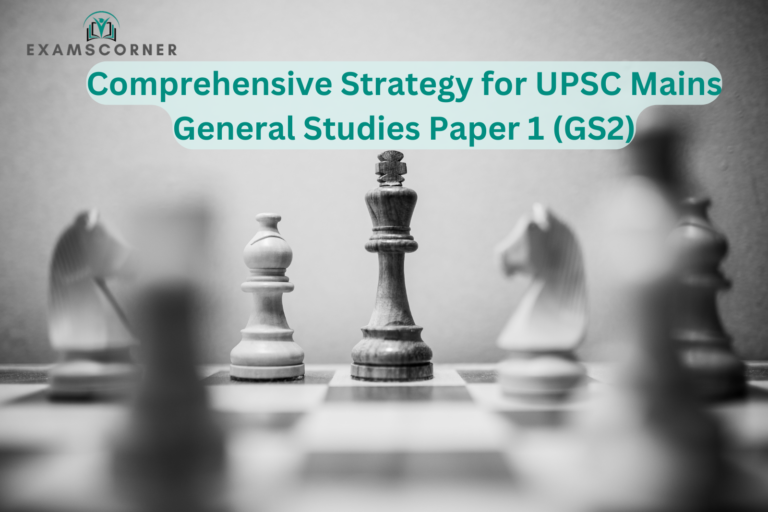The UPSC Mains General Studies Paper 2 (GS2) focuses on governance, constitution, polity, social justice, and international relations. To excel in GS2, candidates need a structured approach that combines conceptual clarity with analytical skills. This guide outlines the Strategy for UPSC Mains General Studies Paper 2 (GS2), essential resources, previous year question analysis, and a robust preparation strategy.
1. Understanding the GS2 Syllabus
GS2 is divided into several sections, each with its unique requirements. Here is a detailed breakdown:
A. Governance and Constitution
Topics: Functions and responsibilities of the Union and the States, separation of powers, significant provisions of the Constitution.
Sub-Topics:
Parliamentary system vs. Presidential system.
Amendments to the Constitution: Procedures, landmark cases.
Federalism: Cooperative and competitive aspects.
Local governance: Panchayati Raj Institutions (PRIs) and urban bodies.
B. Polity
Topics: Comparison of the Indian constitutional scheme with that of other countries, judiciary, executive, and legislature.
Sub-Topics:
Appointment and role of Governors.
Judicial review and judicial activism.
Role of NGOs and SHGs in governance.
C. Social Justice
Topics: Welfare schemes, mechanisms for vulnerable sections, issues relating to poverty and hunger.
Sub-Topics:
Government schemes: Beti Bachao Beti Padhao, PM-KISAN.
Social sector policies: Health, education, sanitation.
Role of civil services in democracy.
D. International Relations
Topics: India’s neighborhood relations, bilateral agreements, international institutions.
Sub-Topics:
India’s foreign policy: Look East, Act East policies.
Role in global institutions: UN, WTO, BRICS.
Emerging issues: Climate change, global trade wars.
2. Recommended Book Sources
A. Governance and Constitution
Indian Polity by M. Laxmikanth.
Introduction to the Constitution of India by D.D. Basu.
NCERT Class XI Political Science: Indian Constitution at Work.
B. Polity
Our Parliament by Subhash Kashyap.
Second ARC (Administrative Reforms Commission) Reports.
C. Social Justice
Social Problems in India by Ram Ahuja.
Reports by NITI Aayog, Ministry of Social Justice.
D. International Relations
India’s Foreign Policy by Rajiv Sikri.
Ministry of External Affairs website for updates.
Newspapers like The Hindu, Indian Express (Editorial sections).
3. Analysis of Previous Year Questions
Analyzing previous year papers is crucial to understanding question trends and weightage:
Insights:
Questions on governance often focus on current developments, such as e-governance initiatives.
Constitutional topics emphasize analytical aspects, e.g., comparing federal structures of India and the USA.
Social justice questions probe welfare schemes’ effectiveness and challenges.
International relations questions often relate to India’s bilateral relations and participation in global institutions.
Preparation Tips Based on Analysis:
Focus on contemporary issues and their linkage to static topics.
Practice writing answers with examples from recent events.
4. Comprehensive Preparation Strategy
A. Integrated Approach
Link Static and Current Affairs: Relate constitutional provisions to recent Supreme Court judgments or legislative changes.
Example: Analyze the Right to Privacy judgment in the context of Article 21.
Interlink Sections: Use governance aspects in social justice or international relations answers.
B. Answer Writing Practice
Regularly practice writing answers with proper structure: introduction, body, and conclusion.
Incorporate diagrams, flowcharts, and data points wherever relevant.
Example: Use a flowchart to depict the steps in cooperative federalism.
C. Time Management
Allocate dedicated time slots to each section based on weightage.
Prioritize weaker areas while revising strengths.
D. Effective Revision
Use concise notes for quick revision.
Create a one-page summary for every major topic.
E. Mock Tests and Evaluation
Take sectional and full-length tests to assess preparation.
Analyze feedback to address gaps.
F. Utilize Reliable Resources
Stick to a limited set of books and supplement them with credible online sources.
Follow government websites and PIB (Press Information Bureau) updates.
G. Case Studies and Examples
Prepare real-life examples and case studies to enrich your answers.
Example: Use Kerala’s model of decentralized governance for questions on PRIs.
5. Conclusion
Acing GS2 requires balancing conceptual understanding with current affairs. Regular practice, systematic revision, and an analytical approach to answer writing can significantly enhance your performance. By following this strategy and staying consistent, you can confidently tackle the diverse and challenging questions in UPSC Mains GS2.



